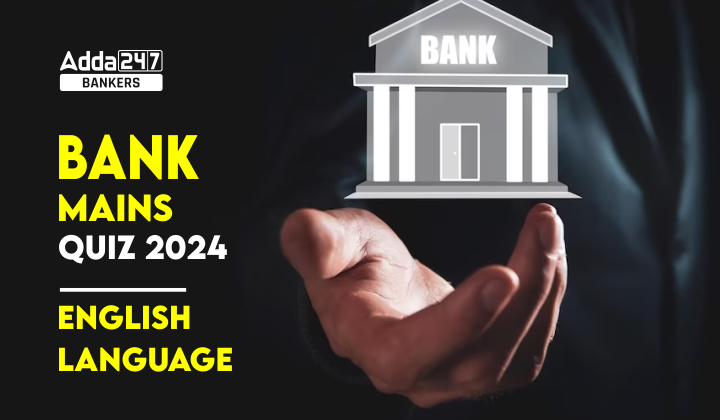Directions (1-5): In each of the given questions an inference is given in bold which is then followed by three paragraphs. You must find the paragraph(s) from where it is inferred. Choose the option with the best possible outcome as your choice.
Q1. Electric vehicles can reduce urban pollution significantly.
[I] Addressing vehicular emissions is within our grasp but requires a multi-pronged approach. It needs to combine the already-proposed tighter emission norms (in form of BS VI), with a push for shared mobility and public transport and adoption of alternate mobility technologies. While shared mobility can moderate the demand for individual vehicle ownership and usage, technology solutions today can allow for a sharp reduction in emissions per vehicle. Government policy will impact adoption that will affect both the extent and the future growth of urban pollution.
[II] The policy roadmap should encompass three key elements based on global learnings. First, incentives for adoption of alternate mobility technologies. Second, restrictions on elements that contribute negatively to strategic objectives (such as congestion charges on polluting technologies), and last provision of enabling infrastructure.
[III] There is a need to impose restrictions through supply-side regulations on OEMs to increase production of zero emission vehicles to curb urban pollution. Most Western countries adopt enforceable norms that ensure supply of electric vehicles. China has mandated OEMs to produce 10 per cent electric vehicles of their total production. There will, of course, be the need to think about improving the provision of non-polluting public transport. These include electric buses, metros, and shared EV fleets to reduce traffic and usage.
(a) only (II)
(b) only (III)
(c) both (I) and (III)
(d) all (I), (II) and (III)
(e) none of these
Q2. NHPS’s model tender document leaves several questions unanswered .
[I] Immediately after the announcement of National Health Protection Scheme (NHPS), questions were raised over the capacity of the country’s healthcare system to handle a project of such proportions. There were also apprehensions that private hospitals would milk the NHPS by prescribing unnecessary investigations. The Model Tender Document for The Selection of Implementing Agencies For the NHPS, released by the Union Ministry of Health and Family Welfare, tries to address some of these concerns.
[II] In the order, AIIMS Director referred to the office memorandum issued on November 17, 2022, advising that ‘AIIMS Smart Card’ facility for patients and their attendants shall be started with effect from April 15, 2023, in collaboration with the State Bank of India. This was done to move to digital payments mode and to improve patient convenience so that they do not have to stand in queues for making payments for various investigations and procedures or for getting snacks/food in cafeteria etc, the order stated.
[III] The model tender document states that nearly 47 per cent of the packages under the NHPS, including those related to heart ailments and cancer, require pre-authorisation. In other words, hospitals empanelled under the scheme cannot perform these procedures until they have an authorisation letter from the NHPS’s Implementation Support Agency. Such concerns were raised when the scheme was announced. With about two months to go for the NHPC’s launch, it is disquieting that the government has not yet managed to address them convincingly.
(a) only (II)
(b) only (III)
(c) both (I) and (III)
(d) all (I), (II) and (III)
(e) none of these
Q3. Latest alterations in textbooks short-circuit established processes, undermine NCERT autonomy
[I] In a major break with practices until 2016, in the current process of alterations in NCERT books, there was no consultation between the NCERT’s chief advisors and the TDCs that prepared the books during 2005-9. There was no alert to writer-contributors who had not waived their rights over their contributions. Nor is there any indication that a prevailing system of revision, referring to TDCs, has itself been officially revised. The names that figure on the books as “textbook development committees” remain the same, though most of them have not been involved in the insertion/revision process. The lack of intimation reflects on the independence of such an establishment.
[II] The fact that much of the textbook material has been left alone in the latest NCERT changes indicates that the pedagogic purpose and outcome of the initiative are still able to argue for themselves; and that the initiative is still valued in the NCERT establishment. This, in turn, raises questions about why the current changes have been made as they have. The long arm of political directive is suggested to an be an obstruction — in an autonomous body that has shown its ability to take an imaginative course while generating a discursive relationship with all those involved in education, without rendering itself an arm of the state.
[III] In history, this was to be achieved with due attention to the formative processes in Indian and world history from a plurality of perspectives; in economics, sociology and political studies, commerce and geography, it involved a wide invocation of the experiences of India’s various communities while preserving the interactive domain of the Social Sciences and the value of the disciplines individually. A series of NCERT Focus Group Reports of the mid-2000s articulated aspects of this agenda.
(a) both (I) and (II)
(b) only (III)
(c) only (II)
(d) all (I), (II) and (III)
(e) none of these
Q4. Since policy-making and implementation increasingly need specialists, lateral entry into senior levels of bureaucracy is a good idea.
[I] The UPSC system does draw people from diverse educational backgrounds — doctors, engineers, graduates in the social sciences, humanities and management studies — into the Indian Administrative Service (IAS). But the IAS’s scheme of posting and transfer values general competency more than specialised skills. This means that by the time a bureaucrat attains seniority, she has served in so many departments that her original set of skills and expertise has attenuated considerably.
[II] The Centre’s decision to make possible “lateral entry” of “talented and motivated Indian nationals” into the senior levels of the bureaucracy is a much-needed reform. In an advertisement issued on Sunday, the Department of Personnel and Training invited applications from outstanding individuals, including those from the private sector, for appointment to joint secretary-level posts. Although it is an initial offering of 10 posts in areas such as financial services, agriculture, environment, renewable energy, transport and revenue, the move could be a significant step towards fulfilling the longstanding need for domain specialists in positions crucial to policy-making and implementation of government schemes.
[III] AI has emerged as a leading economic and national security consideration for the federal government, given the investments and uncertainties caused by the launch of new AI tools such as ChatGPT that can generate text, images and sounds. The Biden administration also is looking at congressional legislation and working with other countries and the European Union on rules for managing the technology.
(a) both (I) and (II)
(b) only (III)
(c) only (II)
(d) all (I), (II) and (III)
(e) none of these
Q5. SBI to stop handling payments for oil imports from Iran.
[I] As winter tightens its grip on various regions, an unspoken yet pervasive menace emerges — cold waves that not only lead to bone-chilling temperatures but also cast a profound shadow on community well-being. From the physical strain that plummeting temperatures cause to the subtle yet grievous blows to mental resilience, cold waves impact all facets of human well-being.
[II] The new Indian government has promised to put the economy back on an accelerated growth path with reforms in the energy, financial, and employment sectors. Energy is the backbone of the Indian economy, so the right energy policies will spur growth in all other sectors. With India soon expected to be the world’s third largest energy consumer, there is an urgent need to get these right: current demand for imported coal, oil, and natural gas is significantly outpacing domestic production, and the country is being forced to spend valuable foreign capital to procure additional energy resources.
[III] With temperatures hitting record lows, communities grapple with a spectrum of physical health challenges. Prolonged exposure to extreme cold can lead to hypothermia, a condition where the body loses heat faster than it can generate it, resulting in shivering, confusion, and potentially life-threatening consequences. Respiratory issues come to a head as cold air irritates the airways, worsening conditions like asthma and bronchitis.
(a) both (I) and (II)
(b) only (III)
(c) only (II)
(d) all (I), (II) and (III)
(e) none of these
Solutions:
S1. Ans. (b)
Sol. Read the paragraphs carefully. Among the given paragraphs, only the (III) paragraph concludes the given inference. It is describing about the production of more electric vehicles for private as well as for public transport, to reduce the increasing pollution.
S2. Ans.(c)
Sol. After reading the paragraphs carefully, it can be understood that the paragraphs (I) and (III) depict the given inference. Paragraph (I) has mentioned the release of model tender document of NHPS which states its concerns regarding the implementation of the scheme in such a vast scale. Moreover, it also expresses its agitation towards the private hospitals which may receive undue benefits from the schemes. Paragraph (III) is describing about the issue mentioned in the model tender document of NHPS of the requisite of pre-authorization to perform on heart ailments and cancer from the NHPS’s implementation support agency.
S3. Ans. (a)
Sol. Among the given paragraphs, paragraph (I) and (II) are deducing the given inference in bold. The inference is stating that the latest alterations made in NCERT books didn’t follow the revision process like it used to earlier. Though being an autonomous body, this incident shows the weakness of NCERT. Drawing a hint from the sentence of paragraph (I) “The names that figure on the books as “textbook development committees” remain the same, though most of them have not been involved in the insertion/revision process”, the given inference can be concluded. Moreover, paragraph (II) is also questioning these alterations in a critical manner. This can be understood from the sentence “This, in turn, raises questions about why the current changes have been made as they have”. While, the sentence “…in an autonomous body that has shown its ability to take an imaginative course while generating a discursive relationship with all those involved in education, without rendering itself an arm of the state” expresses that NCERT has failed to correctly implement the revision process in spite of being an autonomous body. However, paragraph (III) fails to depict the given inference as it is merely describing the alterations made by NCERT in the textbooks.
S4. Ans. (c)
Sol. The given inference in bold states that with the help of lateral entry at senior levels of bureaucracy better policy making and implementation can be done. After reading the paragraphs, it is inferential that only paragraph (II) provides the given inference since, it is describing about the entry of new and talented personnel at joint-secretary levels which is vital for policy-making and implementation of government schemes.
S5. Ans. (e)
Sol. The given inference is stating that SBI will not manage the oil payments of Iran. After reading the paragraphs it can be understood that this inference is not expounded in any of them.
. .





 English Language Quiz For Bank Foundatio...
English Language Quiz For Bank Foundatio...
 English Language Quiz For Bank Mains Exa...
English Language Quiz For Bank Mains Exa...


